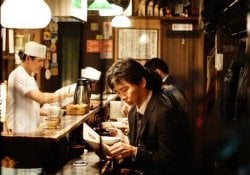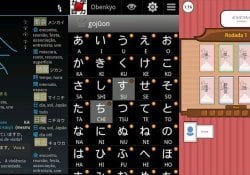As you listen to the song over and over again, it's different or even the same song (using to listen until you get sick) our memory makes you remember some parts of the song.
Many prefer to use books, movies, anime, manga among other things to gain knowledge and make it possible to go beyond learning. Music in part calms the person, and through simple means between sound and the brain it is used through social interaction, in communication.
How many words of motivation, reflection or whatever your working concept for human life was taken from one or several lyrics of the song? Well, pretty much every day.
Today we are going to translate a little song. Unlike breaking down music, we're not going to study the entire music, we're going to take just a few important words, and let you do the rest of the work.
Índice de Conteúdo
Criteria
- First: Não se desespere se errou uma, duas ou até várias palavras. Ninguém nasceu sabendo tudo;
- Second: Have the objects you need for your studies on hand. And it is worth remembering that before you have to know what you are going to study. Make a workload for life control. We recommend using tools such as jisho para compreender totalmente as palavras;
- Third: Mergulhe de cabeça no aprendizado, foque em você, não nas pessoas. Lembrando que o Proverbio Japonês cita: ‘’ O prego que se destaca é martelado’’, ou seja, sempre vai ter aquelas pessoas que vão tirar proveito da pressão psicológica e vai fazer com que a pessoa que quer destacar na vida passe no sufoco..;
Well, let's go? today the music will be Dir en Gray - Lotus
Letra da música dir en grey- lotus
眼を閉じる
此処は蒼い 朱鷺が鳴く 心の底
嵐が連れ去った 明日を感じたいから
剥がれ朽ちる絵と
記憶からまだ涙を消せない
この闇の音も
きっとそれはもう癒えない
何処かで知りながら
記憶からまた涙を落とし
周りを見渡す
きっとそこにはもう誰の
為でもない今が…独り
消えない傷でも綺麗でしょ?
夢が枯れてもまだ愛せるの?
確かに煌く明日じゃない
壊れそうなその意思は
振る返る為の傷じゃない
記憶からまだ涙を消せない
この闇の音も
きっとそれはもう癒えない
何処かで知りながら
壊れ行く 夜が 目の前で
何もかも捨てた お前は月
泣いて眠ればいい
過ちが生き方を変えはしない
気高く真っ白な 蓮を咲かせ
背に描いた 意思はもう揺るがない
自由な空 眼を閉じよう
What is believing?
Translation of the song
I close my eyes
This place is blue, the toki bird cries
The storm took my heart
Waiting to feel tomorrow along with the image that is now peeling and rotting
Can't erase the tears from memory
Even that sound of darkness
Probably won't heal
De alguma forma, sabendo que...
Tears came running up again from the memory
Look around
there is probably no one
para viver agora... sozinho
The wound that doesn't erase, isn't it so beautiful?
If the dream withers, will you still love?
It's true, tomorrow won't be all bright
Your weak intention is not a scar
Giving you a reason to look back
Can't erase the tears from memory
Even that sound of darkness
Probably won't heal anymore
De alguma forma, sabendo que...
the night is ending
Throwing it all away in front of your eyes, you are the moon
You must cry and sleep
One mistake won't change anyone's way of life
Be proud and let the pure white lotus flower
Your strong intentions won't be shaken anymore
Free skies, close your eyes
What is believe?
The article is still halfway through, but we recommend also reading:
Some important words
- me (目 or め) = eye
- manaka (眼 ou まなこ) = olho ou globo ocular;
- tojiru (閉じる ou とじる) = ato de fechar;
- koko (ここ) = aqui;
- aoi (青い) = blue
- kokoro (心 or こころ) = heart
- soko (そこ) o = is there
- arashi (嵐 or あらし) = for storm
- asu is the same for ashita (あす or あした) = for tomorrow
- kuchiru (くちる or 朽ちる) = to rot, deteriorate, decompose, spoil
- kioku (きおく or 記憶) = memory, remembrance
- otoshi(お とし) = derrubar;
- namida(なみだ or 涙) = tear
- mawari (まわり ou 周り) = os arredores, redor;
- watasu (わたす or 渡す) = to deliver
- kono (この) = esse aqui ou esse;
- kesenai (消せない) = indelible (act of being durable)
- yami (やみ or 闇) = darkness or darkness
- ima (いま or 今) = now
- hitori (一人 or ひとり) = alone
- furikaeru (振り返る ou ふりかえる ) = olhar para trás, virar a cabeça;
- kizu (きず or 傷) = wound, scar
- kirei (きれい or 綺麗) = pretty, beautiful
- tashika ni (たしかに) = it's true
- yume (ゆめ or 夢) = dream
- suteta (すてた) = throwing (away) logo: suteru is throwing (away)
- ayamachi (あやまち or 過ち) = for indiscretion or error
- kedakai (けだかい ou 気高い) = nobre, exultante;
- hasu (はす or 蓮) nelumbo nucifera
- ishi (いし or 意思) = intentions or purpose
- jiyuu (じゆう ou 自由) = liberdade, livre;
Article written by Leo Sadao!







